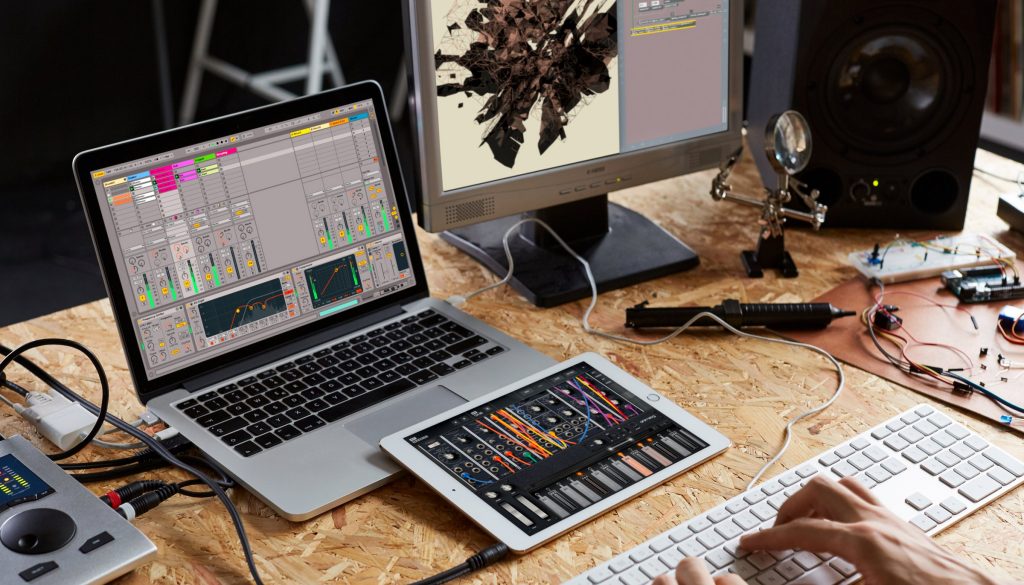Ableton Link is coming to desktops, and going completely open source. And that means the best tool for wireless sync and jamming is about to get a lot more popular.
On iOS and for Ableton Live users, Ableton Link is already a revelation. It allows any number of different apps to sync up with one another without fuss. That includes two more machines running Ableton Live, of course. But it could also be two apps on an iPad, or an iPhone and an iPad, or an iPad and a copy of Ableton Live. It completely changes live jamming: instead of needing tech and setup, you only need friends.
And this is what was unique about Ableton Link. Almost from day one, it was something that embraced developers outside Ableton’s own offices.
Well, that’s about to accelerate – a lot. Ableton Link goes from being a tool for Ableton Live that happens to have an iOS mobile SDK to a lot more. You can actually look at this as several things happening at once.
Ableton Link is desktop-ready. There’s now a complete desktop SDK available on GitHub, complete with example apps for Windows, macOS, and Linux.
Ableton Link is open source, free software. All the source code for Ableton Link is available on GitHub. (It’s written in C++.) It’s also liberally licensed, under a GPLv2 license – free as in freedom. And if you do want to build proprietary software, there’s a licensing option. (There’s more to discuss here for those of us in the free software community as far as license compatibility, but I’m also less worried about that precisely because I feel the team at Ableton are flexible enough to have a discussion if the legal license itself doesn’t answer a question.)

Meet “other platforms.”
There are desktop partners – Propellerhead, Cycling ’74, and Serato. Um, wow. Not only are these the developers of three flagship apps, but they each represent essential music making communities (the Reason, Max, and Serato DJ communities being some of the most passionate anywhere). And they mean the launch partnership covers three categories of tools (a music studio, a DIY music toolkit, and a DJ app).
And each has been involved in various kinds of innovation. Propellerhead have played a key role in the evolution of the ideas we have today about software as instruments, as well as how software could interoperate (with ReWire). Max/MSP has been an environment where new ideas in music software often emerge, and was even the playground used by the founders of Ableton before they founded Ableton. And Serato is notable because they helped contribute to how sync works in Live today. (The planned integration for The Bridge having failed is itself significant; I think these days, we’d be happy just to have simple sync and not worry about something so over-ambitious.)
Obviously, more will follow. I’m disappointed not to see Native Instruments here, for instance, as I think being involved is important to NI’s stated mission of pushing standards.

Serato joins Ableton. All photos courtesy Ableton.
The iOS SDK has also been updated, and will continue to grow. There’s a 2.0 SDK, improved example apps, and of course Link is becoming a standard in iOS tools that use sync.
More platforms can follow. Now, here’s where things get interesting. Linux support means all kinds of unique platforms, like the Raspberry Pi. (The Link team has already tested a RasPi; I will, too, for sure.) That opens up sync-able hardware. And while there’s no official Android SDK or example apps, I’m certain we’ll see some intrepid Android developers make their own in a hurry – there’s already everything they need in the SDK.
Just making something open source doesn’t magically make stuff happen. (Trust me on this. Apart from using open source tools every single day, I’ve been involved in the management of both open source hardware and software.) So this isn’t a “build this and they will come” sort of deal. And that’s why I’m excited by the team at Ableton working on this. Not only did they create the best technology in the business for sync and jamming, but I trust them to manage this as an open source tool. Florian Goltz, with whom CDM spoke on background for this article, is now Link Open Source Project Owner, and Michaela Buergle remains Link Product Owner. (Michaela was I think one of the most eloquent speakers at Loop, which is important – making technology successful is not just an engineering problem, but a communication problem, as well.)

Now, having heaped that praise on Ableton, I think the next step is up to us. We have to build interesting apps with this tech, and find ways of playing with tools and with each other to make better music. I also hope those of us advocating open source software and education (cough, uh, like me) can find ways of helping people realize their own ideas for new tools with this platform.
For users:
https://www.ableton.com/en/link/
For developers:
https://ableton.github.io/link/
Find software:
https://www.ableton.com/en/link/apps/